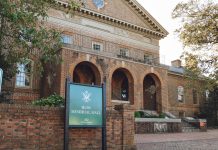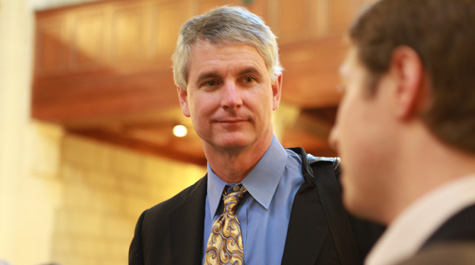More than 20 years ago on the verge of graduation, Mike Tierney ’87 sat in a small office in Morton Hall, struggling to choose a future. Today, Tierney, a George and Mary Hylton associate professor of international relations, will receive the Thomas Jefferson Teaching Award.
Sitting in that cramped office, Tierney jumped from idea to idea, trying to decide what to do once graduation arrived. He mentioned government jobs and even the Marines before his academic adviser, government professor Joel Schwartz, gestured to the room around them and said, “What about this?”
The idea stuck. After working with Schwartz to determine the necessary steps, Tierney attended graduate school at the College and went on to receive a Ph.D. from the University of California San Diego.
Over the years, Tierney became assimilated into the world of academia. In the last decade, he has published two books and numerous articles while also finding time to attend international relations conferences throughout the U.S.
He also co-founded and directs two College research initiatives — AidData and Teaching, Research and International Policy — despite refusing the bulk of the credit.
“Almost all my good ideas for research came from conversations with students,” he said.
The origins of AidData, a research program that analyzes the allocation of foreign aid, can be traced back to a night at the Green Leafe with former students. As for TRIP, a research program that studies the relation between instruction, research and politics of international relations, Tierney merely instructs others to “blame James Long.”
James Long ’03 is a former student whose questions about the way international relations is instructed led Tierney to undertake the project.
His focus on students is also reflected in his disapproval of the “fad of distance learning,” as classrooms grow so large that students are forced to squint down at professors from stadium-like lecture rooms.
Instead, he described his preference for a much different education system.
“Small classrooms where faculty get to know their students by name [are ideal],” Tierney said.
Dialogue between teacher and student, he said, and between students themselves, can bring about better results than the traditional lecture and response format.



































